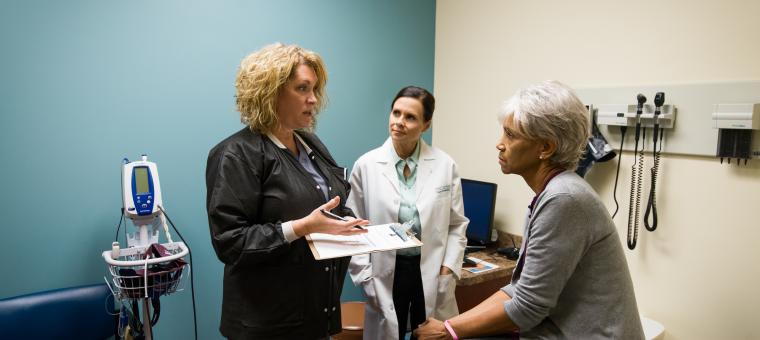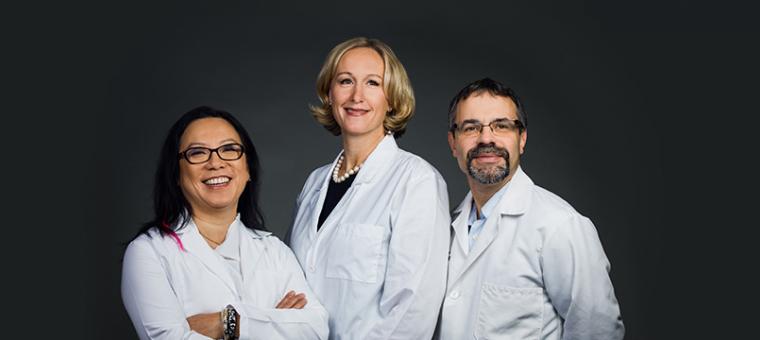« Back to Blog
Lung Cancer Awareness Month: Early screening, biomarker testing, and targeted therapies can help save lives
November is Lung Cancer Awareness Month and bringing heightened attention, understanding, and support to a disease that kills more people than any other cancer couldn’t be more important. Every 2.2 minutes someone is diagnosed with lung cancer and one in 16 Americans will be diagnosed with lung cancer in their lifetime. 1
Although smoking is a major risk factor for lung cancer, it is not the only cause. According to the CDC, roughly ten to 20% of lung cancers, or 20,000 to 40,000 lung cancer cases each year in the United States occur in people who never smoked or smoked fewer than 100 cigarettes in their lifetime.
“A common misconception about lung cancer is that it’s a smoking related disease,” said Alexander Spira, MD, PhD, FACP, a medical oncologist and director of the Virginia Cancer Specialists Research Institute. “At this point, I have more non-smoker patients than patients who have smoked. Anyone with lungs can get lung cancer.”
More than half of people diagnosed with lung cancer die within one year of diagnosis and the lung cancer five-year survival rate (18.6%) is lower than many other leading cancer sites, such as colorectal (64.5%), breast (89.6%) and prostate (98.2%) 2 . However, lung cancer does not have to be a death sentence as new treatments are being developed and, if caught early enough, lung cancer may be curable.
“Lung cancer tends to be a more aggressive disease and more patients are diagnosed after it has progressed,” said Dr. Spira. “Lung cancer screening is very important to catch the disease early and there are guidelines for when patients with a significant history of smoking, or exposure, should get screened.”
According the American Lung Cancer Association only 5.7% of those at high risk are screened, however if everyone currently eligible were screened, close to 48,000 lives could be saved 3. The five-year survival rate for people diagnosed with late-stage lung cancer is approximately five percent. Lung cancer screening, with a low dose CT scan, is designed to detect cancers at an early, potentially curable stage when patients have no signs or symptoms of lung cancer.
Once a patient does receive a lung cancer diagnosis, biomarker testing can be performed to help doctors identify the potential for treatment with targeted therapies. It is recommended that all patients with newly diagnosed lung cancer undergo complete biomarker testing with a full next-generation sequencing panel. The testing results could inform which FDA-approved therapies or clinical trials in which the patient is eligible.
Unfortunately, not all patients have equal access to these promising therapies, as obstacles prevent certain patients from obtaining testing necessary to utilize some of these treatments. For new advances to reach their full potential, existing inequalities must be recognized and eliminated so all patients who seek care have equal opportunity to receive the best and most targeted therapies.
The MYLUNG Consortium™ is searching for a deeper understanding of molecular testing barriers to improve care for lung cancer patients, including those with mutations who may benefit from receiving precision medicine, the practice of leveraging targeted therapies across the continuum of care, and expand the opportunity for patients to participate in clinical trials. This unique, collaborative real-world research consortium will study up to 12,000 NSCLC patients in the community setting over a five year period.
“In order to fulfill the promise of precision medicine for NSCLC patients, we need a broader understanding of the barriers, challenges, risks and opportunities around molecularly guided therapies,” noted Robert L. Coleman, MD, FACOG, FACS, chief scientific officer, US Oncology Research. MYLUNG will draw insights from these datasets that can lead to better therapy for patients in a timelier manner. Learn more about the MYLUNG Consortium™ research study and the first phase results.
1 LUNGEVITY Lung Cancer Facts https://www.lungevity.org/for-supporters-advocates/lung-cancer-awareness/lung-cancer-statistics
2 American Lung Association Facts : https://www.lung.org/lung-health-diseases/lung-disease-lookup/lung-cancer/resource-library/lung-cancer-fact-sheet
3 https://www.lung.org/getmedia/381ca407-a4e9-4069-b24b-195811f29a00/solc-2020-report-final.pdf

